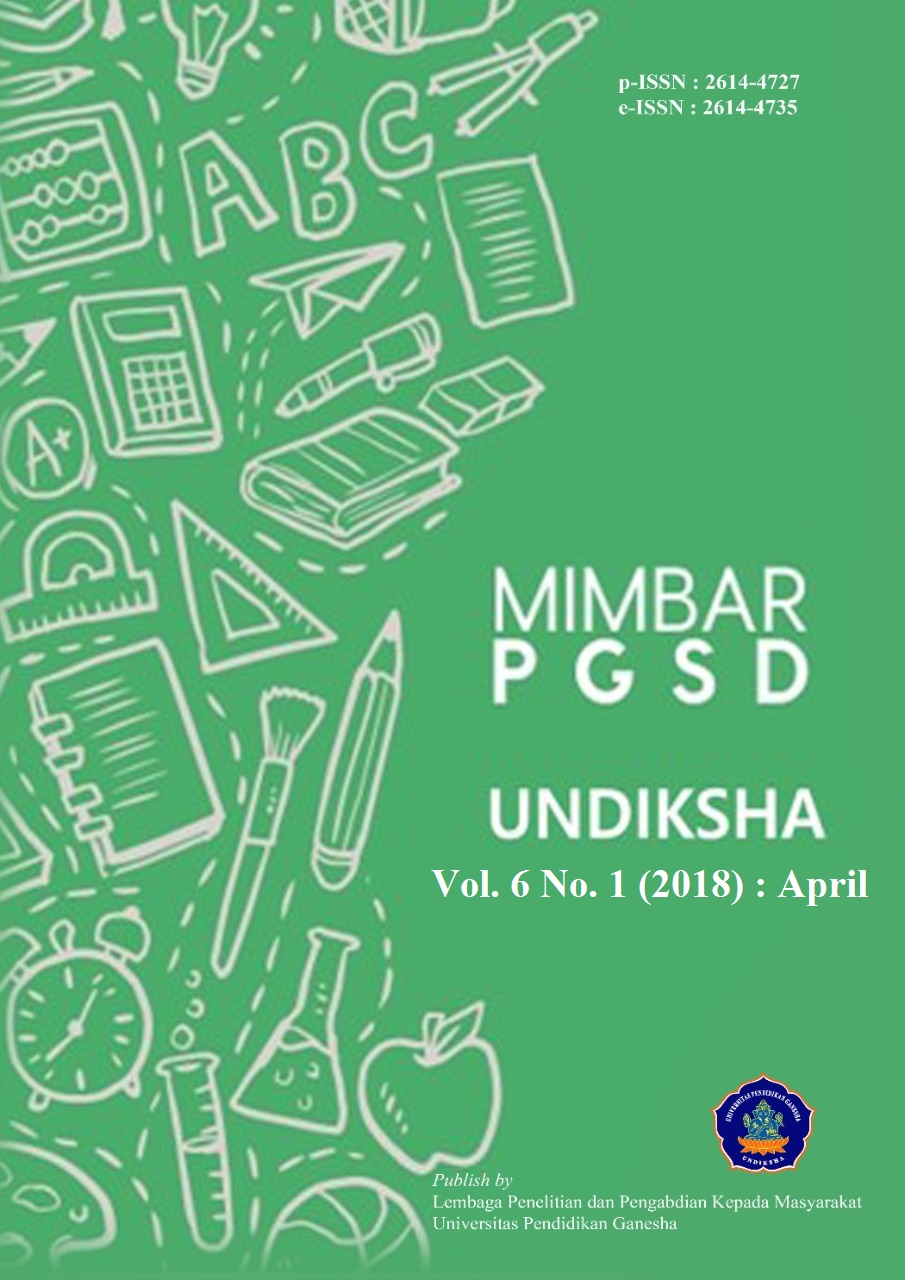PENGARUH MODEL PEMBELAJARAN KOOPERATIF TIPE TEAMS GAMES TOURNAMENT (TGT) BERBANTUAN MEDIA LINGKUNGAN TERHADAP HASIL BELAJAR IPA SISWA KELAS IV DI GUGUS V KECAMATAN SAWAN
DOI:
https://doi.org/10.23887/jjpgsd.v6i1.13106Abstract
Penelitian eksperimen semu ini bertujuan untuk mengetahui perbedaan hasil belajar IPA antara siswa yang belajar dengan menggunakan model pembelajaran kooperatif tipe TGT berbantuan media lingkungan sekitar dan siswa yang belajar dengan menggunakan pembelajaran konvensional pada siswa kelas IV di Gugus V Kecamatan Sawan tahun pelajaran 2016/2017. Populasi penelitian ini adalah kelas IV di Gugus V Kecamatan Sawan tahun pelajaran 2016/2017. Sampel penelitian berjumlah 23 orang siswa kelas IV SD Negeri 1 Sangsit dan 26 orang siswa kelas IV SD Negeri 8 Sangsit. Instrumen penelitian ini berupa tes hasil belajar IPA. Data yang dikumpulkan dianalisis menggunakan analisis statistik deskriptif dan statistik inferensial (uji-t). Hasil penelitian menunjukkan bahwa thit = 5,88 dan ttab = 2,021. Hal ini berarti bahwa thit > ttab. Artinya, terdapat perbedaan yang signifikan hasil belajar IPA antara siswa yang belajar dengan menggunakan model pembelajaran kooperatif tipe TGT berbantuan media lingkungan sekitar dan siswa yang belajar dengan menggunakan pembelajaran konvensional. Dari rata-rata ( ), diketahui ( ) kelompok eksperimen sebesar 19,02 dan ( ) kelompok kontrol sebesar 14,08. Hal ini berarti bahwa ( ) eksperimen > ( ) kontrol. Dengan demikian model pembelajaran kooperatif tipe TGT berbantuan media lingkungan sekitar berpengaruh terhadap hasil belajar IPA siswa kelas IV di Gugus V Kecamatan Sawan tahun pelajaran 2016/2017.Kata Kunci : model pembelajaran kooperatif tipe TGT, media lingkungan sekitar, hasil belajar
This quasi experimental research was aimed to find out the difference of science achievement between students who learnt science by using cooperative learning type TGT model combined with environmental media and students who learnt by using conventional learning. This research was designed as post test only control group design. The population of this research was fourth grade students in cluster V Sawan sub-districtin academic year 2016/2017. The samples of this research were fifth grade students which consisted of 23 students of SD N 1 Sangsit and 26 students of SD N 8 Sangsit. The instrument that was used in this study was test. Data that were obtained were analyzed by using descriptive statistic and inferential statistic (T-test). The result of the analysis was thit = 5,88 and ttab =2,021. It meant that thit > ttab. The analysis showed that there was significant difference of science achievement between students who learnt science by using cooperative learning type TGT model combined with environmental media and students who learnt by using conventional approach. The average ( ) of students achievement showed that the average of experiment group was 19,02 and the average of control group was 14,08. Which meant that the average ( ) of experiment group > the average ( ) of control group. Thus, cooperative learning type TGT model combined with environmental media influenced the science achievement of fourth grade students in cluster V Sawan sub-district in academic year 2016/2017.
keyword : cooperative learning model type TGT, environmental media, learning result
Published
2018-01-25
How to Cite
., N. L. S. S., ., D. I. D. K. T. M., & ., D. I. N. M. M. (2018). PENGARUH MODEL PEMBELAJARAN KOOPERATIF TIPE TEAMS GAMES TOURNAMENT (TGT) BERBANTUAN MEDIA LINGKUNGAN TERHADAP HASIL BELAJAR IPA SISWA KELAS IV DI GUGUS V KECAMATAN SAWAN. MIMBAR PGSD Undiksha, 6(1). https://doi.org/10.23887/jjpgsd.v6i1.13106
Issue
Section
Articles
License
Authors who publish with the Mimbar PGSD Undiksha agree to the following terms:
- Authors retain copyright and grant the journal the right of first publication with the work simultaneously licensed under a Creative Commons Attribution License (CC BY-SA 4.0) that allows others to share the work with an acknowledgment of the work's authorship and initial publication in this journal.
- Authors are able to enter into separate, additional contractual arrangements for the non-exclusive distribution of the journal's published version of the work (e.g., post it to an institutional repository or publish it in a book), with an acknowledgment of its initial publication in this journal.
- Authors are permitted and encouraged to post their work online (e.g., in institutional repositories or on their website) prior to and during the submission process, as it can lead to productive exchanges, as well as earlier and greater citation of published work. (See The Effect of Open Access)













